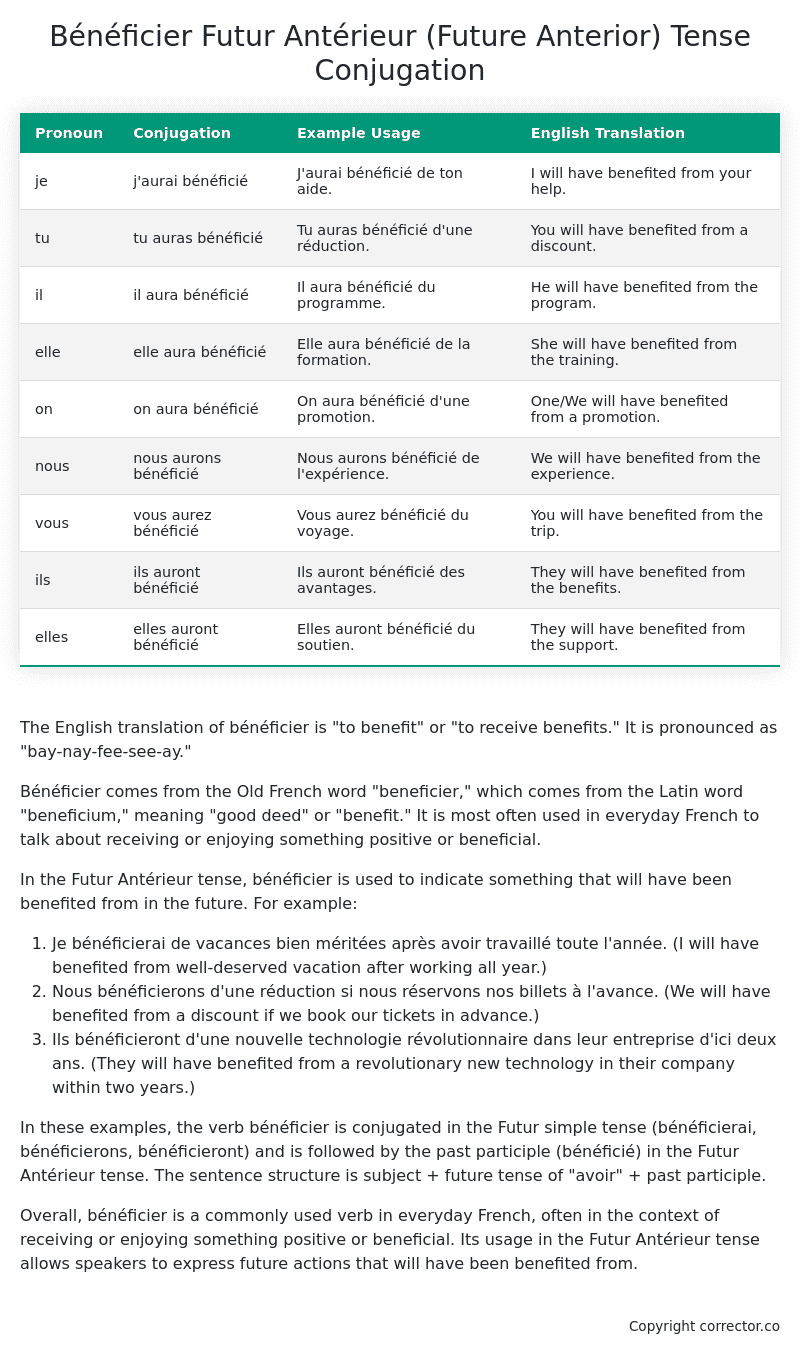Futur Antérieur (Future Anterior) Tense Conjugation of the French Verb bénéficier
Introduction to the verb bénéficier
The English translation of bénéficier is “to benefit” or “to receive benefits.” It is pronounced as “bay-nay-fee-see-ay.”
Bénéficier comes from the Old French word “beneficier,” which comes from the Latin word “beneficium,” meaning “good deed” or “benefit.” It is most often used in everyday French to talk about receiving or enjoying something positive or beneficial.
In the Futur Antérieur tense, bénéficier is used to indicate something that will have been benefited from in the future. For example:
- Je bénéficierai de vacances bien méritées après avoir travaillé toute l’année. (I will have benefited from well-deserved vacation after working all year.)
- Nous bénéficierons d’une réduction si nous réservons nos billets à l’avance. (We will have benefited from a discount if we book our tickets in advance.)
- Ils bénéficieront d’une nouvelle technologie révolutionnaire dans leur entreprise d’ici deux ans. (They will have benefited from a revolutionary new technology in their company within two years.)
In these examples, the verb bénéficier is conjugated in the Futur simple tense (bénéficierai, bénéficierons, bénéficieront) and is followed by the past participle (bénéficié) in the Futur Antérieur tense. The sentence structure is subject + future tense of “avoir” + past participle.
Overall, bénéficier is a commonly used verb in everyday French, often in the context of receiving or enjoying something positive or beneficial. Its usage in the Futur Antérieur tense allows speakers to express future actions that will have been benefited from.
Table of the Futur Antérieur (Future Anterior) Tense Conjugation of bénéficier
| Pronoun | Conjugation | Example Usage | English Translation |
|---|---|---|---|
| je | j’aurai bénéficié | J’aurai bénéficié de ton aide. | I will have benefited from your help. |
| tu | tu auras bénéficié | Tu auras bénéficié d’une réduction. | You will have benefited from a discount. |
| il | il aura bénéficié | Il aura bénéficié du programme. | He will have benefited from the program. |
| elle | elle aura bénéficié | Elle aura bénéficié de la formation. | She will have benefited from the training. |
| on | on aura bénéficié | On aura bénéficié d’une promotion. | One/We will have benefited from a promotion. |
| nous | nous aurons bénéficié | Nous aurons bénéficié de l’expérience. | We will have benefited from the experience. |
| vous | vous aurez bénéficié | Vous aurez bénéficié du voyage. | You will have benefited from the trip. |
| ils | ils auront bénéficié | Ils auront bénéficié des avantages. | They will have benefited from the benefits. |
| elles | elles auront bénéficié | Elles auront bénéficié du soutien. | They will have benefited from the support. |
Other Conjugations for Bénéficier.
Le Present (Present Tense) Conjugation of the French Verb bénéficier
Imparfait (Imperfect) Tense Conjugation of the French Verb bénéficier
Passé Simple (Simple Past) Tense Conjugation of the French Verb bénéficier
Passé Composé (Present Perfect) Tense Conjugation of the French Verb bénéficier
Futur Simple (Simple Future) Tense Conjugation of the French Verb bénéficier
Futur Proche (Near Future) Tense Conjugation of the French Verb bénéficier
Plus-que-parfait (Pluperfect) Tense Conjugation of the French Verb bénéficier
Passé Antérieur (Past Anterior) Tense Conjugation of the French Verb bénéficier
Futur Antérieur (Future Anterior) Tense Conjugation of the French Verb bénéficier (this article)
Subjonctif Présent (Subjunctive Present) Tense Conjugation of the French Verb bénéficier
Subjonctif Passé (Subjunctive Past) Tense Conjugation of the French Verb bénéficier
Subjonctif Imparfait (Subjunctive Imperfect) Tense Conjugation of the French Verb bénéficier
Subjonctif Plus-que-parfait (Subjunctive Pluperfect) Tense Conjugation of the French Verb bénéficier
Conditionnel Présent (Conditional Present) Tense Conjugation of the French Verb bénéficier
Conditionnel Passé (Conditional Past) Tense Conjugation of the French Verb bénéficier
L’impératif Présent (Imperative Present) Tense Conjugation of the French Verb bénéficier
L’infinitif Présent (Infinitive Present) Tense Conjugation of the French Verb bénéficier
Struggling with French verbs or the language in general? Why not use our free French Grammar Checker – no registration required!
Get a FREE Download Study Sheet of this Conjugation 🔥
Simply right click the image below, click “save image” and get your free reference for the bénéficier Futur Antérieur tense conjugation!

Bénéficier – About the French Futur Antérieur (Future Anterior) Tense
Construction
Common Everyday Usage Patterns
Interactions with Other Tenses
For example
Summary
I hope you enjoyed this article on the verb bénéficier. Still in a learning mood? Check out another TOTALLY random French verb conjugation!


